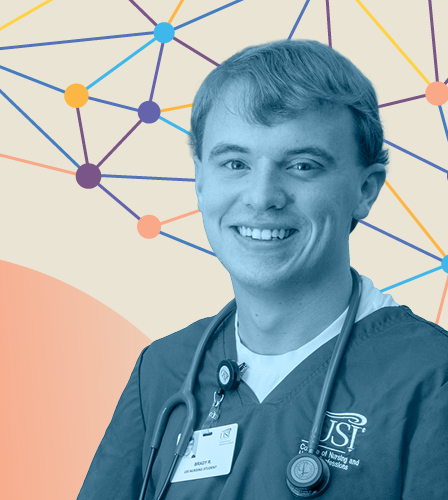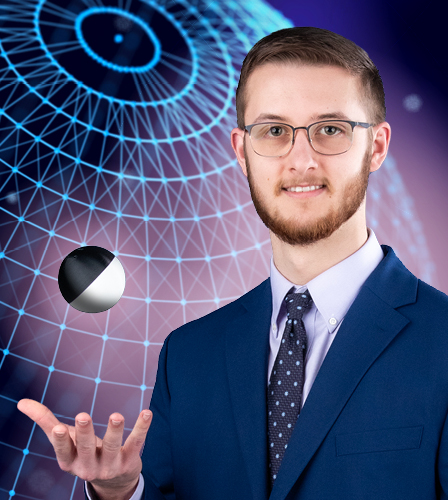Seeds of Change
by C. L. Stambush
Seeds of Change
In a way, Courtney Johnson ’15 is like a farmer tending a plot of land. In this analogy, it’s easy to envision him surveying a long-forgotten field as he thinks about what to sow, assessing the soil to understand which nutrients are lacking and then cultivating it so that the kernels he plants can develop strong roots that grow into sturdy plants and sustain many.
While he shares farmers’ philosophical mission to grow and nourish, the 6’4” man with an infectious smile and dressed in a sharp suit looks nothing like the men and women who plow the soil. Johnson’s acreage consists of city blocks made of concrete and bricks. Instead of funneling his efforts into crops of corn and soy, he tills the community by seeding hope and paths to success for Evansville’s underserved youth.
What started as one-on-one mentoring of 11 students at Glenwood Leadership Academy and Lodge Community School in 2013, after moving back to Evansville and while a student at USI, blossomed into a nonprofit organization called Young & Established (Y&E). “I didn’t really know what I was doing when I first got started,” he says. “I just knew I wanted to help people.” Over the past seven years, Y&E’s fund raising, mentoring and tutoring services have impacted many lives by hosting 50 drives (eight annual events), raised more than $150,000 and mentored/tutored 112 students.
Johnson cut his entrepreneurial teeth on lending a hand—acts that shaped and strengthened his spirit in the process. When he was 8 years old, he tagged along with his father mowing lawns and later sold candy. In high school, he organized dance parties by booking venues, hiring security and DJs, and promoting the events. By the time he arrived at Indiana State University in Terre Haute, Indiana, he’d graduated to raising $3,000 in two days for Susan G. Komen Breast Cancer Foundation—a feat the national nonprofit took note of and offered him a position organizing events. “That molded me without me knowing it was something I was going to do in the future,” he says.
Back then, the future was different for the Evansville native. After graduating from Benjamin Bosse High School, where he played basketball as a Bulldog, he headed to Kentucky Wesleyan to play football as a Panther. He wanted to transfer to Indiana State University but going from a private to a public college meant some credit hours weren’t compatible, so he attended Ivy Tech Community College to earn transferable credits. “I bounced around a lot. I tell people that’s not a bad thing,” he says. “I’m a people person. I was able to network and meet a lot of great people at different universities.”
True to his nature, Johnson got involved at Indiana State, organizing mentoring programs, joining the student government association and becoming a big brother for Big Brothers Big Sisters. With his public relations and communications studies, and experiences, he envisioned himself in someplace like Los Angeles or New York City. But fate had other plans.
After three years in Terre Haute, a family member’s illness led him to return to Evansville. Eyes and heart open, Johnson took a long look at his hometown community and saw some patches that needed tending. “I felt there were gaps,” he says. “There are a lot of organizations and nonprofits [in town], but I felt like there were people in our community being left out.”
Being on the outside is an experience Johnson knows intimately but rarely shares with others.
He’s private to the point of not saying which family member was ill or what the illness was that caused him to come home. The persona Johnson wears publicly 364 days a year is...happy. Passionate. Unfailingly enthusiastic and upbeat. To hear the marketing entrepreneur, life coach and unpaid CEO of Y&E talk about the families that need help or the responsibilities of running the new community center Y&E opened this spring during the pandemic, makes you wonder when he sleeps; something his mother asks him too.
But on June 2, his public façade cracked when he posted a video a few days after watching George Floyd die when a Minneapolis police officer put his knee on Floyd’s neck for eight minutes and 46 seconds. In Johnson’s 23-minutes-and-54- seconds-video post, he shared his personal experiences as a Black man growing up in Evansville, of racial profiling, saying that as a high schooler he was detained by the police, while at the Fall Festival with a group of friends, because he wore clothes similar to someone who was reported to have a gun.
“I was really emotional that week [Floyd was killed] because of the things I’ve had to deal with,” Johnson says. “I don’t ever want to sound like I’m complaining because I’ve accomplished a lot. But what I’ve had to deal with right here in my own community, when all I’ve ever wanted to is better our community...”
As Johnson’s voice trails off, you hear his resistance to revealing too much of his experiences. He has tried to in the past, he says, but people didn’t want to hear it. Didn’t want to believe it, he thinks, because of his successes.
Lee Ann Shafer, BPS Advisor and Instructor in Professional Studies, says Johnson doesn’t get the recognition he deserves. She counseled him when he was earning his Bachelor of Professional Studies at USI and continues to follow his good works—the toy, food, milk, school-supplies drives—that he posts on social media.
As a student himself, Johnson mentored kids at two middle schools and calling on friends via social media to join him to clean up parks in the city’s forgotten areas. “I’m always passionate as far as helping people and giving back, but I really wanted to get others involved in what we are doing.”
Dr. Anne Statham saw Johnson be interviewed by Brad Byrd on television and invited him to speak about his work to his fellow peers in her ethics of global engagement course. “I think what he is doing for the community is quite amazing. He has really made a difference in the community around several important issues and is an inspiration to other students to see they can be effective.” The professor emerita of sociology says he was a leader in the classroom and committed to bettering communities, inspiring students to become more active in the community and volunteerism.
“It was a good feeling to know that a professor on campus was really happy about the work I was doing and wanted to be involved and got her students involved as well,” Johnson says. “That was really encouraging.”
Such encouragement filters in from many sources within the community, but none is stronger than what his family—both immediate and extended—provides. “My family has always been a giving family, in doing things for the community or church,” Johnson says. When he speaks, you can hear the gratitude, seeds sown by those who went before him, in his common refrain of “I’ve been blessed.”
Like a farmer, Johnson works long hours, saying the responsibility he feels can be stressful because the work is nonstop. “It’s every day,” he says. “I could have kids or parents calling me at 3 a.m. needing food. Or a young man or young lady needing a ride or dealing with some type of abuse at home. You really don’t turn anything off.”
At 31 years old, with gray hair beginning to pepper his trendy cut, Johnson admits there were times when being elsewhere sounded attractive. “I think we lose a lot of young people [to other cities],” he says, “especially minorities.” But what kept him rooted here was his family and being involved in the community. “I prayed on it. I kept telling myself this was where I was supposed to end up. I felt like I would be giving up on the community [if I left], that was the reason I wanted to stay and do everything I could to help Evansville.”
No longer a one-man operation, with Johnson hopping from school-to-school mentoring and tutoring Evansville’s youth, Y&E now has a nine-member board of directors, nine tutor and mentor volunteers and up to 77 volunteers for certain events. A community center—the only one in a 10-mile radius—provides a safe space and learning opportunities, replete with computers, Wi-Fi, washers and dryers, a food pantry and more to come.
COVID-19 alerted Johnson and his nonprofit of the precarious food situations some families are forced to navigate. They simply didn’t have enough to eat and couldn’t get it, he says, and were reaching out to Y&E. Johnson spent weeks delivering bags of food to those in need, an eye-opening experience for him, and motivation to establish a community garden next summer in one of the city’s food deserts.
“Seeing things grow. I don’t know what it is about seeing how fast things grow, it’s a good feeling,” he says, referring to the garden but probably, subconsciously, talking about something else. “Knowing that you did it. That you grew it. It’s a great feeling.”






